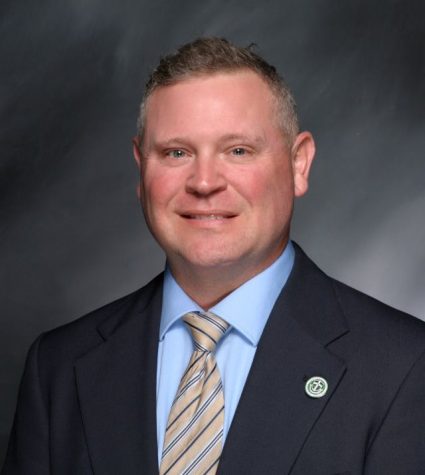Reverbs from the ECHO Chamber — a Q & A with Mr. Patrick Heintz
April 22, 2020

Another in a continuing series of Q & A interviews with Trinity faculty, staff and administrators.
From working on life-saving medications to discovering a new species of cockroach, Trinity teacher Mr. Patrick Heintz definitely has an interesting resume. During his time at Trinity, he has taken students to Costa Rica to perform research. Science has always been part of his work, even doing research for the Brown-Forman Corporation.
Q: What degrees do you have?
A: I have three. I got an undergraduate from U of L in biology with a concentration in fishery management. Then I got a secondary science teaching degree. Then I have a post-grad (degree).
Q: What kind of research did you perform at Brown-Forman?
A: My primary job was in fermentation. That included fermentation and distillation of Jack Daniels. I formed research on how to extract fusel oils out of Jack Daniel’s distillation process. Fusel oils are a subset of alcohol that are toxins. One of my jobs was to find a spot in the distillation process and temperature to distill out just the fusel oils. What we did actually worked. We were able to pull it down from 5,000 parts per million to about 2,000 parts per million. I also worked on ciders. It was the highest-rated drink that had gone through that testing facility.
Q: Why go to Costa Rica?
A: What is really exciting is seeing discoveries that the kids make. Every year we go, some kids make pretty unique discoveries. One year we discovered the world’s smallest cockroach, which lives alongside the leaf-cutter ants. One group discovered that the thickness of the trails corresponds with the leaf-cutter colonies, so if you are going to be using pesticides, you could just measure the trail to figure how much you should use.
Q: What is the main kind of research done in Costa Rica?
A: We had kids do research on leaf-cutter ants and how to kill them, because farmers need their crops. We go to a chocolate farm to help save their crops and do it organically. They were getting the toxins from the backs of toads and seeing if it could deter leaf-cutter ants.
We had a group last year that dissected butterflies, and they saw how much bacteria grew in each phase of their development. That is pretty significant because it ties into antibiotics research. This year kids will be participating in a tag and release of sting rays.
Q: Do you guys study sea turtles in Costa Rica?
A: We work with a researcher who shows us what she does, and we go out and try to find sea turtles. On our summer trips we have not found any, but we found quite a few on our winter trip.
Q: What research are you doing right now?
A: I am working right now with butterflies. I have a test subject running in my incubator. While my students are raising theirs, I am raising my own.
Q: What do you enjoy about teaching?
A: I always knew I wanted to teach. I enjoy traveling with the kids (in the summer). When I coached, I enjoyed coaching. Right now, I enjoy having my son go here. He comes with me, and I enjoy being involved with what he does, so that’s pretty cool.

